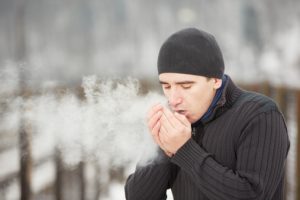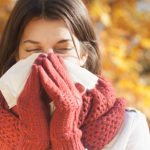 Asthma in the winter can trigger asthma attacks and seasonal allergies. The cold winter air can be an asthmatic’s worst nightmare as it makes it far more difficult to breathe. Generally, asthma attacks increase during the winter months, not solely because of cold air, but because individuals spend more time inside, which can expose them to dust and mold.
Asthma in the winter can trigger asthma attacks and seasonal allergies. The cold winter air can be an asthmatic’s worst nightmare as it makes it far more difficult to breathe. Generally, asthma attacks increase during the winter months, not solely because of cold air, but because individuals spend more time inside, which can expose them to dust and mold.
This double-whammy of cold air and indoor pollutants can make winter an even more dreadful time – especially if you have asthma.
Triggers for winter asthma
Advertisement
A trigger is something that causes you to have an asthma attack. This can vary from person-to-person, but common triggers include pets and pet dander, dust and mold and cold, dry air. When a person with asthma encounters a trigger it becomes more difficult for them to breathe and can lead to coughing, wheezing, and difficulty catching your breath.
In the winter time, cold air can be a trigger for asthma. Not only does cold air trigger asthma symptoms, but it is also related to many upper respiratory infections that can be far worse in individuals with asthma.
 The many ways in which cold air affects our breathing include:
The many ways in which cold air affects our breathing include:
- Cold air reduces the effectiveness of the mucus transport whose responsibility is to trap particles and organisms so they do not enter the lungs. Cold air causes mucus to become thicker, making it harder to remove dangerous particles.
- Cold air affects the nose by once again causing mucus to become thicker, making it difficult to breath and leading to nasal congestion and stuffiness.
- When cold air enters the lungs they release histamines, which leads to wheezing – this is worse in asthma sufferers.
How cold air affects asthma
The lungs in a person with asthma are much more sensitive than those in a person who does not have the respiratory condition. Cold air in the lungs of an asthmatic causes what’s called a bronchospasm, which is inflammation of the lungs. Muscles around the bronchial tubes becomes contracted and narrow, leading to greater difficulty in breathing. An increase in mucus also contributes to wheezing, coughing and tightness in the chest.
If a person with asthma has it under control, then they can limit the amount of winter-time asthma attacks they experience. But for a person who does not have their asthma well managed, winter can be a nightmare full of scary situations every time they step outside their front door.
Tips to handle asthma attacks during winter
If you have asthma, you know how difficult winter time can be, but it doesn’t have to be that way. Here are some tips to help you handle asthma attacks during the winter.
- Wash your hands: This ensures you do not spread or contract colds, which can make asthma much worse.
- Get the flu shot: Likewise, you will want to protect yourself against the flu as well.
- Don’t sit closely to fireplaces: Inhaling smoke can make breathing even harder.
- Keep your mouth closed: Breathing from your nose instead of your mouth will reduce the amount of cold air that can get into your lungs and cause an asthma attack.
- Replace filters: Ensure filters in home heating devices and air filtrations are clean.
- Exercise indoors: Also remember to warm up before working out.
- Take preventative steps against asthma flare-ups: Take your medication prior to going outside, at least 30 minutes before or as directed by your doctor.
- Have an action plan: Even if you follow these tips, an asthma attack can still occur, so have a plan to recognize the symptoms, have the appropriate medications on hand and know when to call your doctor or emergency persons.
- Take your medications: Even though any time of the year you should be following your asthma regime, it is more important in the winter to help prevent serious complications.
Exercise tips for asthmatics during winter season
 Exercise is very important for health, even if you have asthma. If you have asthma and still want to enjoy outdoor exercising in the winter, follow these tips.
Exercise is very important for health, even if you have asthma. If you have asthma and still want to enjoy outdoor exercising in the winter, follow these tips.
- Ensure your mouth is covered, either with a neck scarf, ski mask, or turtle neck. Ensure your nose is also kept warm and that you’re inhaling warm air – as stated, inhaling cold air can lead to congestion.
- If it is very cold or there is a weather alert, avoid exercising or even shoveling the snow outdoors, this can be a risky time if you have asthma and it is more likely you will experience an attack.
Generally, for asthmatics, exercise should take place indoors during the winter, but even so there are some tips to help you better prevent an asthma attack.
- Ensure heating filters are changed.
- Use a humidifier in the room where you exercise; indoor heat can be dry and irritate the lungs.
- Ensure the area is clean and dust-free.
Top triggers for winter allergies, including asthma
Winter allergies, too, can trigger asthma. Here are some of the most common triggers of winter allergies that can worsen your asthma.
- Pet dander
- Mold and mildew
- Temperate climates
- Damp wood
Related Reading:
Anxiety can aggravate asthma: Study
New research reveals that anxiety can aggravate asthma. Anxiety is characterized as having a fear of fear. Managing asthma can be much more difficult for those who also have anxiety, according to the recent study. The research comes from the University of Cincinnati. Continue reading…
Advertisement
Mayo Clinic suggests taking less asthma medication is possible
A recent Mayo Clinic study suggests that taking less asthma medication can be done safely and cost effectively if patients follow guidelines. Doctors commonly scale down asthma medication prescriptions due to how costly they can be, but knowing when to begin cutting back can be challenging and the risks need to be better understood. Continue reading…
Sources:
http://www.mana.md/asthma-and-winter
http://www.webmd.com/asthma/features/winter-asthma
http://www.achooallergy.com/learning/coping-with-asthma-during-winter
http://allergicliving.com/2010/07/02/asthma-cold-air-and-exercise
http://www.nhs.uk/Livewell/asthma/Pages/asthma-cold-weather
http://www.everydayhealth.com/asthma/tips-to-make-winter-easier-on-your-asthma
http://www.healthcommunities.com/asthma/tips-winter-asthma
http://www.medicinenet.com/script/main/art
http://asthma.ca/teamasthma/asthma_ExerciseandCold
http://www.webmd.com/allergies/features/winter-mold-allergies-risk
